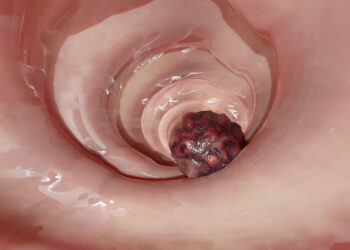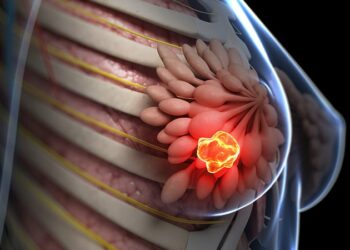Two recent studies have added to the growing body of research suggesting consuming more dairy reduces a person’s risk of getting colorectal cancer.
A prospective cohort study in Nature Communications published in January looked at the incidence of colorectal cancer (CRC) in more than 540,000 UK women over 16 years and found a 14% reduced risk for the cancer for every 200 g of dairy milk consumed per day. It also found an 8% reduced risk per 50 g of yogurt per day.
The other study, from GutMicrobes, also published in January, looked specifically at yogurt intake with a focus on Bifidobacterium, a bacteria commonly found in yogurt. The researchers found that people who had at least two servings per week of yogurt had a 20% lower risk for Bifidobacterium-positive tumors than those who had less than one serving per month of yogurt, “suggesting the antitumor effect of yogurt intake on the specific tumor subgroup.”
Together, these studies and other recent systematic reviews raise questions about whether dairy foods or fermented dairy foods in particular reduce CRC risk independent of the calcium they provide. The association between higher dietary calcium and lower CRC risk has a longer, more established research base, but it’s possible there are other aspects of dairy foods in addition to calcium that provide some benefit.
“Traditionally, when we’ve thought of colorectal cancer, we’ve associated it with the dietary factors of alcohol and red and processed meat on the negative side, and whole foods on the positive side, essentially fruits, nuts, vegetables, etc.,” said Christopher J. Damman, MD, MA, a clinical associate professor of gastroenterology at the University of Washington Medicine, Seattle. “The dairy factor is a little bit new.”
Earlier Research on Dairy Intake
A 2019 systematic review and meta-analysis in Advances in Nutrition included more than 22,000 participants from 15 cohort studies and 14 case-control studies looking at associations between dairy intake and CRC risk. The cohort studies found a 20% lower risk for CRC with higher consumption of dairy products overall (relative risk [RR], 0.80; P < .01) and an 18% reduced risk specifically with higher milk consumption (RR, 0.82; P < .01) compared with lower consumption. The risk was substantially lower for high-fat dairy products (RR, 0.68; P < .01). Meanwhile, a 9% reduced risk for low-fat dairy products (RR, 0.91; P = .22) was not significant, neither was a 10% reduced risk for fermented dairy products (RR, 0.9; P = .32); however, only four studies looked at fermented dairy products. In the case-control studies, only total milk intake was significantly associated with a reduced risk (RR, 0.85; P = .03) while other products had no statistically significant associations.
Because it was a meta-analysis, however, it could only compare “highest” with “lowest” consumption levels without defining cutoffs for what constituted a “high” or “low” level of intake, a limitation of the other systematic reviews as well.
An earlier 2017 systematic review and meta-analysis, published in the Annals of Oncology by scientists at the World Cancer Research Fund, found “pretty consistent” trends in reduced cancer risk with any dairy intake across Europe, the United States, and Asia, noted Anne McTiernan, MD, PhD, a professor of epidemiology at Fred Hutch Cancer Center, Seattle. For each additional 400 g of dairy foods people consumed per day, they had a 13% reduced risk for CRC.
A 2022 systematic review and meta-analysis in Frontiers in Nutrition exclusively looked at yogurt consumption and CRC risk in 16 studies and found a modestly reduced risk overall (OR, 0.87), with a greater reduction seen in the case-control studies (OR, 0.75) than the cohort studies (OR, 0.91). These results go along with similar findings showing a decreased risk for CRC with fermented dairy foods more broadly seen in a 2019 meta-analysis published in the International Journal of Cancer. Though the findings in the 2022 review looked sound, McTiernan said, it had some notable limitations, such as inclusion of at least one study that looked only at polyps instead of cancer and double-counting of a few datasets. Both of these analyses looked at a greater number of studies on fermented dairy foods than the 2019 Advances in Nutrition study, which had only four cohort studies and one case-control study that included fermented dairy foods.
The Role of Calcium in Dairy
The link between optimal calcium intake and reduced CRC risk is well-established, said William Grady, MD, a professor and medical director of the Gastrointestinal Cancer Prevention Program at Fred Hutch Cancer Center in Seattle.
The recent Nature Communications study found a 17% reduced risk associated with each additional 300 mg/d of calcium intake. In comparing how strongly different factors correlated with each other, dairy milk was more strongly correlated with calcium than yogurt, but calcium intake did not appear to entirely explain the reduced risk for either milk or yogurt.
“These findings [of the Nature Communications study] underscore the multi-faceted role that diet plays in colon cancer development and show that calcium-rich foods like dairy are key players in colorectal cancer risk reduction,” said Anam Khan, MD, an assistant professor of gastroenterology, hepatology, and nutrition at The University of Texas MD Anderson Cancer Center in Houston. “Colon cancer is the third most commonly diagnosed cancer among all cancers and the second leading cause of cancer-related death in the United States,” she said. The population at large could benefit from ensuring their diet includes good amounts of dairy, Khan said, adding that 300 mg is the amount of calcium in a single 8-oz glass of milk, “so really, just taking a glass of milk a day will provide that benefit.”
Rashmi Verma, MD, an associate professor of medical oncology at the University of California Davis, noted that other components in dairy, such as conjugated linoleic acid, butyric acid, and sphingomyelin, have been shown to inhibit growth of some CRC cells in animal studies. Grady also noted investigation into other proteins in dairy that may be related to the lower CRC risks, but that research remains preliminary and incomplete, making it difficult to tell whether the reduced risk in dairy is mostly calcium-related or derives from other dairy components.
Microbiome Health As a Mechanism
Meanwhile, the Gut Microbes study raises questions about whether effects on the microbiome from fermented dairy products plays a role in reduced risk, but less research exists to support this possibility, Grady said.
McTiernan found the Gut Microbes study “intriguing,” but “too preliminary to take much away from it.”
“The association between yogurt intake and reduced colorectal cancer risk was seen in bifidobacterium-positive cancers but not bifidobacterium-negative cancers, so that supported their hypothesis,” McTiernan said. “However, the hypothesis doesn’t explain why risk of bifidobacterium-negative cancers would be increased with eating more yogurt. There’s a risk of this being a chance finding by splitting up cancer types.”
Still, the study raises questions about ways in which dairy products, particularly fermented ones, may impact the gut microbiome in ways that modestly affect CRC risk. Understanding the interactions of the gut microbiome and cancer is still “relatively uncharted territory” where data is accruing but still evolving, Verma said.
Some literature suggests, for example, that those with microbiomes richer in “good bacteria” can “mediate the effect of environmental factors on the risk of colorectal cancer,” she said. That is, someone with a poorer diet — such as one with a lot of red meat — but a good microbiome will have less damage than someone with a poor gut microbiome who’s also getting environmental insults, she said. She therefore does advise her patients to eat yogurt with active cultures for the sake of hopefully supporting gut health.
“Genes are like a loaded gun, and the environmental insult is like pulling a trigger,” Verma said.
She noted that CRC incidence has been increasing in younger populations, and when she takes histories of her younger patients, she also takes a dietary history to learn whether there are possible correlations there.
“I have noticed these patients were not consuming enough dairy products, and the majority of my younger patients have a really high intake of processed meat and red meat and lower vegetables intake,” Verma said.
While it’s possible yeast plays a role in the reduced CRC risks seen in the studies on fermented dairy products, “the data is a lot softer from that perspective,” Grady said. It’s about on par with the early stage of research looking at other proteins and fats in dairy. There are no probiotics developed so far that have been effectively tailored to change the microbiome in a way that can prevent CRC, Grady added, though plenty of companies have tried.
Another challenge of making sense of the findings from these studies is that they all rely on food questionnaires. Though these questionnaires have been validated, they are still subject to recall bias and sometimes social desirability bias. The specific types of foods and criteria for what is considered “dairy” also varies across studies. Some studies included dairy from any type of animal, including cows, goats, and sheep, while others may have focused only on cow products, and only some included yogurt.
Until more large studies can look at individual foods or animal research reveal specific mechanisms for fermented foods to reduce CRC risk, the experts seemed to agree that the apparent benefits for dairy intake in reducing CRC risk are driven primarily by calcium. Additional benefits from dairy foods may exist, but the evidence so far is not strong enough to support what those may be.
Grady reported consulting for Guardant Health, Karius, and GLG; receiving research support from Lucid Dx Diagnostics; and serving on the scientific advisory board for Freenome. No other interviewees had disclosures.
Tara Haelle is a science and health journalist based in Dallas.
Source link : https://www.medscape.com/viewarticle/does-higher-dairy-intake-reduce-crc-risk-2025a10007fn?src=rss
Author :
Publish date : 2025-03-28 07:01:00
Copyright for syndicated content belongs to the linked Source.














